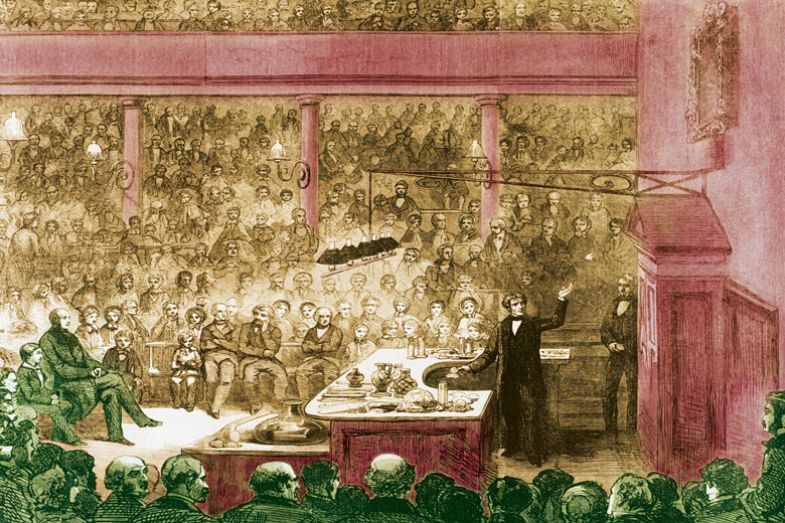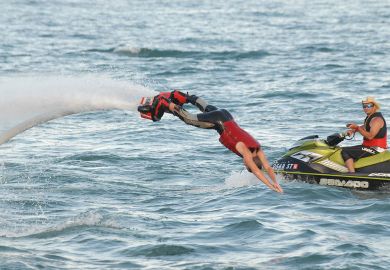Nine o’clock on a cold, dark, winter’s morning. You are trapped. Two hundred pairs of eyes are staring down intently at you from a height. Deep in the ancient reptile stem of the brain, angry voices shout at you: “Why are 200 people all staring at you from a height? Because they are going to kill you and eat you. Why else?”
In almost 20 years of lecturing – at the universities of Southampton, Cardiff and Durham – they never did. And yet a nagging edge of this fear always remains for many lecturers, even when something alarmingly extraordinary becomes more ordinary over time. The sense that eyes are more of a problem than bodies was pinpointed nicely by a colleague of mine at Southampton. Her solution to lecturing nerves was simple: she took off the glasses she wore for distance vision.
In the early days and weeks of mastering this art, the theory of the carefully written lecture can easily melt under the fierce heat of all those curious eyes. For those who find this a problem, it is a problem of pressure, of too much presence, too much energy, compressed into one space for a brief time.
Who would have guessed how many lecturers would miss all this during the long months of lockdown?
Most lecturers would agree that if you were giving a lecture blindfold to a receptive audience in a theatre, you could still sense some degree of reaction and presence. But even the most scintillating public speaker is not going to sense anything if the students scattered across a virtual live lecture do not turn their microphones on. (Even software formats that give the raw numbers of those present do not guarantee that all of them are actually listening.)
Like so many other things, lecturing has been drastically reshaped by the global pandemic. Yet this extreme enforced adaptation should also prompt us to reflect on just how strange lecturing is, even under ordinary conditions.
Lecturers are implicitly distinguished by their title. There are tutors and teachers, but at the top of the pyramid there are lecturers. And in theory the prestige attaching to the title is hard-earned. No one else does this. Not actors, not rock stars, not politicians. You think and write and shape the content. You deliver it in one take, with no backing band, and with the only drug on offer (at least for me) being too much coffee. For much of your working week, your job necessitates spending too much time alone. For those few lecturing hours, you must stay above water as the fizzing waves of 100-200 teenagers' attention beat down upon that fragile lectern.
It is not an easy job. Small wonder so many people are unable to do it – including quite a lot of those who bear that distinguished title of lecturer. There are many ways to lecture well and many to lecture badly. So is there one basic secret to success? I want to argue that there is. The lecture itself of course needs to be well written, properly structured, thought-provoking and timed for the slot. But those dozen sheets of paper are not the lecture. If there is one secret to successful delivery, it is probably this: be there.

This may sound strange. But when you are there, in the very best way, you can create a potent work of art. The dangerous energy of all those watching eyes becomes your energy. Two hundred people become one person. The crashing waves of pressure become the crest on which you can surf down to the end of the hour. Surplus presence becomes a warm fizz of feedback. The lesson is: give enough, and they will give you a lot back.
Thirty years ago, when I sat in the concrete brutalist theatres of the University of Leeds studying English, I knew that the very best lecturers were really there: Andrew Wawn, John Whale, the late and much-loved Inga-Stina Ewbank, Paul Hammond and Guy Cook, to name but a few.
Not many people can simply, breezily, be themselves in such a situation. But over time it becomes possible to be at least a real part or version of yourself. Back in those days, there were few handouts and even fewer images. Almost no one used a microphone, although some had to shout for the back rows.
Tellingly, the one person who did use a microphone was barely there. He seemed to bring nothing of himself to the lecture. He clearly wished he was elsewhere. And in those days, it was not a bland little icon that informed you that “a student has left”. It was the flapping doors located at either side of each tier of seats – brutally obvious and audible if one or two people were leaving every minute.
This character clearly suffered from too much presence and too much pressure. Yet there was another culprit who was almost equally bad, while betraying not the slightest sign of nerves or shyness.
There was one incontestable sign of just how bad he was. Because his lectures alternated with another, quite brilliant, speaker, with most of us unaware of who was coming from week to week, a scout would be placed on the stairs. Presently the potential audience, waiting out of sight outside the theatre, would hear either, “Quick, it’s Dr X!” or “All clear! It’s Dr Z!” And we would either hurtle away down the back stairs or happily file in.
It was in this context that I heard something that I have remembered ever since. When someone complained about the bad lecturer to the brilliant lecturer, the latter simply stated: “Lecturing is a very difficult art; and some people never master it.” I saw the truth of this time and again in the following 25 years.
The first of those failed lecturers was far too conscious of his audience, and the second seemingly almost oblivious of us. But both in essence got the same thing wrong: they in effect failed to be there, or to bring any viable energy to the event.
There are many debates about the best lecturing techniques and the role of technology. Yet the central question we always need to ask is whether they really allow you to be there.
Take the use of microphones. Lecturers still seem divided on the issue. Some denounce them in a voice of booming scorn. I liked them. Your voice amplified is still your voice. Arguably, it allows you to be there more fully, rather than less so. If you are trying to be yourself, shouting and getting breathless for 50 minutes is not helpful. A microphone can allow you to have something like a normal, even intimate conversation.
Similar questions arise in relation to overhead projectors and visualisers. At Southampton, Jonathan Sawday (who is now Walter J. Ong, S. J. chair in the humanities at Saint Louis University) seemed one of the most naturally effortless, charismatic and brilliant of lecturers. But I still recall him admitting, “It’s a lot easier for you if they’ve got something else to look at.”
Aside from sheer mechanical failure, the worst potential problem with images is lighting. How dark does the theatre need to be to render images clearly visible? And how long do you keep it dark during the hour? The crucial point here is that, even with twenty-twenty vision, you are losing some degree of contact.
And this brings us to the way that some lecturers have decided to let technology use them. These are typically the kinds of lecturers who once tried to hide behind their script; now they are able to hide, with a certain illusion of success, behind a newly slick and anonymising piece of technology.
The furthest extreme of the PowerPoint lecture is an obsessively tech-dominated 50 minutes of images and text in a dark room. At one level, with so much textual content and quotation projected up in cinematic fashion, we already find a reframing of that basic question: are you there? Is the audience listening to you or are they reading a summarised book chapter? After all, if some students find that there is too little of you to bother getting up for a 9am slot, then why shouldn’t they just plead sick and call up the PowerPoint version at a later date?
But the real point is that the students can barely see the lecturer, even if they want to. And if they cannot see your eyes, they are not just losing you. They are losing the excitement of real knowledge, there in your eyes: something really shown, not merely said; something very hard to fake.
Although I cannot imagine giving a PowerPoint lecture, a serious academic who does so is still far more than a technician. By contrast, imagine this. A business studies lecturer, nominally paid to make new knowledge and to fuse research and teaching, delivers someone else’s lecture. He has actually paid for a package of pre-written lectures. I remember the person in question writing a breathtaking article in Times Higher Education where he reflected thoughtfully on how it felt rather odd to be speaking someone else’s words…
This case may well tell us something about business studies, arguably a pseudo-academic subject and just a reflection of a certain phase of capitalism (rather as another pseudo-subject, theology, once dominated universities under an earlier phase of Christianity). But it also hammers home that a lecturer’s being there is what a lecture really is. Speak up as boldly, as dramatically, as wittily as you like, but if you are speaking someone else’s words, a very big part of you is not there.
Perhaps the most lasting effect of lockdown, in this context, will be the normalising of recorded lectures. It was just a few years ago that the recording of any university lecture, even in deserving special circumstances, was grudging or controversial. And a few years before that, many of us in history, English or philosophy glibly held forth about Foucault’s Panopticon – little suspecting that before long we would all have internalised the possibility of speaking once and being watched forever, of being recorded and replayed, for purposes fair or foul.
In November 2019, I gave a public lecture on my book Fairies: A Dangerous History for an audience at London’s Conway Hall. Many times since I have thought back to the sweet vibrant warmth of that audience – to all the things we took for granted, and never knew we had: breath-warm pubs and bars and theatres, when breath was life, not death. At the time, I hardly thought about the recording. Perhaps thanks to lockdown conditions, its YouTube version has now had more than 50,000 views. But even in recorded form, the success of that lecture depends on the live audience. We were all there, and if someone watching it today feels that they are there too, that is still very different from looking at the lone speaker reading into a computer.
In the long and varied history of lecturing, there are many jokes and asides that should never have been made – and now will not be, for fear of recording and reprisals. That is probably a good thing. But other potential losses are sadder. More than once at Durham, some daring colleagues and I staged excerpts from Renaissance or classical drama, by candlelight and with impressive stage blood. A recording might not be the end of the world there. But in the end a captured lecture is a bit like a captured animal: we all really prefer the wild thing.
The same could be said of the trick I played in a first-year lecture on the poet John Donne, to vivify the conceit of seeing yourself in your lover’s eyes. That is actually very close, students: closer than you tend to get to your mother, father, brother, sister, friends…How close? Well, I want everyone to pair up now, and we are going to make a new record. One hundred pairs, all seeing each other in their partner’s eyes, for one minute.
I’d love to tell you about the buzz when we finished that one. But I’m afraid you really had to be there.
Richard Sugg has lectured in English and cultural history at the universities of Cardiff and Durham. He is the author of 13 books, including Fairies: A Dangerous History (2018), Mummies, Cannibals and Vampires (2020) and The Smoke of the Soul: Medicine, Physiology and Religion in Early Modern England (2020). He is currently completing Talking Dirty: The History of Disgust from Jesus Christ to Donald Trump and researching a new book on ghosts and poltergeists.
POSTSCRIPT:
Print headline: The eyes have it
Register to continue
Why register?
- Registration is free and only takes a moment
- Once registered, you can read 3 articles a month
- Sign up for our newsletter
Subscribe
Or subscribe for unlimited access to:
- Unlimited access to news, views, insights & reviews
- Digital editions
- Digital access to THE’s university and college rankings analysis
Already registered or a current subscriber?








